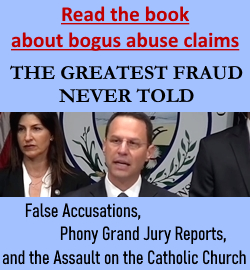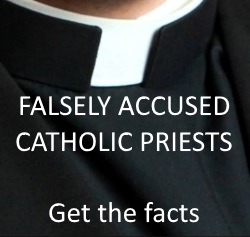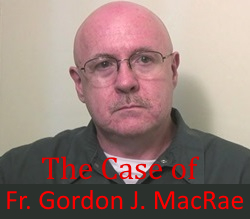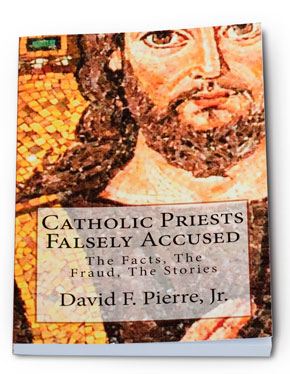A November 6, 2006, Los Angeles Times op-ed by someone named Peter C. Boulay blares the title, "Will Catholicism OK Condoms?" Because of errors in fact and misleading information, the article appears to be just another cheap slap at the Catholic Church by the Times.
The column suggests that the Catholic Church is possibly readying to allow for the use of condoms in "situations in which there is potential for HIV infection." Besides the fact that such an allowance by the Church is quite unlikely, Boulay argues that if the contraception "rule" is changed, the result is a challenge to "the entire contraception doctrine, to the doctrine of papal infallibility and even to the church's abortion rules."
The bottom line: Boulay's article is filled with error, bad theology, and warped reasoning. I've numbered my examples.
1. Boulay challenges the 1968 encyclical Humanae Vitae, which was issued during the papacy of Pope Paul VI. Boulay claims (bold mine),
In a spectacular deviation from the normal quoting of Scripture and the teachings of the church fathers, Humanae Vitae asserts that natural law — the law embedded in the universe — forbids removing the possibility of procreation from the sexual act. The pope's premises and conclusions were based only on reason, no leap of faith required — an almost unheard-of reliance on philosophy, not theology.
Wrong. In fact, even a cursory look at the encyclical reveals that Paul utilizes Holy Scripture no less than sixteen times in formulating Humanae Vitae. (Hey, Mr. Boulay. Pope Paul used something called endnotes.) Also cited are the work of St. Thomas Aquinas (13th c.) and the Council of Trent Roman Catechism (16th c.). Although neither are the work of church fathers, it shreds Boulay's faulty assertion that Paul's "premises and conclusions were based only on reason."
2. Boulay also writes,
Pope Paul's message [in Humanae Vitae] was that it is immoral for a married couple to have sex merely to express mutual love, that they must also preserve the possibility of procreation.
If not completely erroneous, Boulay's words are at the least misleading. Humanae Vitae readily acknowledges (bold mine):
The fact is, as experience shows, that new life is not the result of each and every act of sexual intercourse. God has wisely ordered laws of nature and the incidence of fertility in such a way that successive births are already naturally spaced through the inherent operation of these laws.
But more importantly, Paul continues later on (emphasis mine),
Neither the Church nor her doctrine is inconsistent when she considers it lawful for married people to take advantage of the infertile period but condemns as always unlawful the use of means which directly prevent conception, even when the reasons given for the later practice may appear to be upright and serious. In reality, these two cases are completely different. In the former the married couple rightly use a faculty provided them by nature. In the latter they obstruct the natural development of the generative process. It cannot be denied that in each case the married couple, for acceptable reasons, are both perfectly clear in their intention to avoid children and wish to make sure that none will result. But it is equally true that it is exclusively in the former case that husband and wife are ready to abstain from intercourse during the fertile period as often as for reasonable motives the birth of another child is not desirable. And when the infertile period recurs, they use their married intimacy to express their mutual love and safeguard their fidelity toward one another. In doing this they certainly give proof of a true and authentic love.
Pope Paul is quite clear that the problem arises when artificial contraception is entered into the picture. Artificial contraception violates the "unitive significance and the procreative significance which are both inherent to the marriage act." Married couples must "experience the gift of married love while respecting the laws of conception" (italics mine).
3. Another misleading passage by Boulay:
A few theologians pointed out Paul's errors publicly and incurred the wrath of the church. Charles Curran, for example, who led a group of protesting theologians, was forbidden to continue teaching moral theology at Catholic University.
Besides falsely claiming there were "errors" by Pope Paul, Boulay implies that Curran's teaching job was lost solely on his stance on the contraception issue. This is wrong.
In fact, Curran's beefs with the Catholic Church have not just been with contraception. In 1974, in his "New perspectives in Moral Theology," Curran stated there can be "legitimate dissent" on the topic of abortion and that the Church "should change its teaching and practice on Divorce." (source)
In addition, in his own recent autobiography (Loyal Dissent), Curran writes, "I was asked to reconsider and retract my positions on contraception and sterilization, abortion and euthanasia, masturbation, premarital sexuality, and the indissolubility of marriage" (bold added) (source). (See also, "Vatican II and the Culture of Dissent" by Russell Shaw: "Dissent spread quickly to questions other than contraception. Father Curran mentioned masturbation, sterilization, divorce, artificial insemination, homosexual acts, in vitro fertilization, abortion, and euthanasia.")
Quite simply, it was because of a number of positions that Curran was no longer allowed to teach at Catholic University (CUA). Boulay has misled his readers. In addition, while Paul's Humanae Vitae was issued in 1968, Curran did not finally lose his job at CUA until nearly two decades later (1986).
4. Boulay claims that any change to the contraception "rule" would open "new challenges to the entire contraception doctrine, to the doctrine of papal infallibility and even to the church's abortion rules."
One could go on for quite a while debunking this silly claim, but Boulay debunks himself in his own article. Boulay claims the doctrine of papal infallibility would be challenged "even though Paul did not formally invoke papal infallibility." Good grief. (Questions about papal infallibility? Read this.)
5. Also claims Boulay (bold added),
And yet Humanae Vitae is not, in its reasoning, as absolute as one might think. Paul wrote: "A right conscience is the true interpreter … of the objective moral order which was established by God." Thus he left a sort of conscientious-objector status for those Catholics who could not believe in the evil of contraception.
Operating like a typical liberal "Catholic" politician (e.g., John Kerry), Boulay invokes the conscience doctrine as some kind of celestial "get-out-of-jail-free" card. Like the John Kerrys before him, Boulay wrongly implies that "conscience" is simply doing what one thinks. It is not. The Catechism clearly teaches,
1783 Conscience must be informed and moral judgment enlightened. A well-formed conscience is upright and truthful. It formulates its judgments according to reason, in conformity with the true good willed by the wisdom of the Creator.
What becomes "truthful" is not based on whatever an individual thinks is right. That would be something called moral relativism. (And that's not good, folks.) There is a lot more on this conscience thing in the Catechism. Check it out.
6. Near the end of his piece, Boulay claims,
It is difficult, and one has to be precise, to cite nature as an argument against any natural human endeavor. It is, after all, nature that creates dams, often kills fetuses, prevents conception more often than not, starves and kills animals pitilessly. Paul VI praised man's "stupendous progress in the domination and rational organization of the forces of nature." Condoms and contraceptives, like dams and appendix operations, seem like a good way to fulfill this duty.
Good grief. Comparing condoms and contraceptives to "dams and appendix operations"? I hope this kind of warped thinking doesn't require an explanation.
*^*^*^*^*^*^*^*^*^
The bottom line is that Boulay's article is simply sad and unfortunate. At NewsBusters, we have cited several examples in which the Times has gone out of its way to portray Catholics and Christians in an erroneous or unflattering manner (here, here, and here are just a few examples). The site LA-ClergyCases.com has also cited a number of examples of shoddy reporting by the Times in light of the church abuse scandal.
The Times appears to give little regard to facts when publishing matters involving the Catholic Church and Christianity. Take, for example, a reader's letter that was printed today (Saturday, November 11, 2006). A reader falsely states that the doctrine of papal infallibility was "first expressed" in the 1800's. In fact, the notion of papal infallibility can be traced back to the earliest years of the church. For more on this, read "How to Argue for Papal Infallibility" by Jason Evert at catholic.com. See also this helpful post by 'neophyte' at the Catholic Answers forum page. Did the Times simply take the reader's word for it that what he was saying was truthful? Is there any fact-checking on submitted articles and letters to the Times?
Finally, who is this Peter C. Boulay that he is given such a prominent forum at a prestigious paper such as the Los Angeles Times? A Google search ("Peter Boulay" OR "Peter C. Boulay") reveals essentially nothing. The Times tells us he is "a former religious brother, has been a reporter, magazine editor and editor of a Catholic newspaper. He is writing a book on gender issues within the Catholic Church." Gee, does this "Catholic newspaper" have a name by any chance? Why the mystery? He's writing a book? Good luck … but big whoop. Where are the credentials and credibility?








